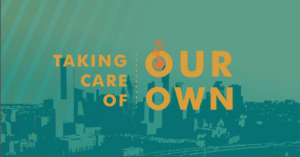“Since the pandemic, I have truly missed the culture of going out to eat and sharing meals with others. It was the way I really connected with people — through food.”
 It is no longer “news” that the pandemic has devastated a key service industry: restaurants. Here in Austin, dozens of iconic restaurants and venues did not make it through 2020. For the establishments that did survive, workers in the service industry face the daily stress of managing mask and social distancing mandates, dealing with recalcitrant customers, and caring for one’s workforce. Our guest on this episode is Nicole Cruz, a Case Manager at Southern Smoke, an organization that provides help and support to food and beverage industry workers. Nicole joins us to talk about what this unique industry is experiencing and the impact of the last year of the pandemic.
It is no longer “news” that the pandemic has devastated a key service industry: restaurants. Here in Austin, dozens of iconic restaurants and venues did not make it through 2020. For the establishments that did survive, workers in the service industry face the daily stress of managing mask and social distancing mandates, dealing with recalcitrant customers, and caring for one’s workforce. Our guest on this episode is Nicole Cruz, a Case Manager at Southern Smoke, an organization that provides help and support to food and beverage industry workers. Nicole joins us to talk about what this unique industry is experiencing and the impact of the last year of the pandemic.
Taking Care of Our Own
Nicole has been working in the food and beverage industry for over 15 years in Houston. Now, she is using her lived experience of working in restaurants and bars to support others as a Case Manager at Southern Smoke, which supports the mental health and well-being of service workers in the food and beverage industry. “Southern Smoke is all built around community,” says Nicole. “Its slogan says it all: taking care of our own. We’re here to help and support our food and beverage industry locally and nationally.”
Nicole has spent her entire life in Houston, and she misses its lively restaurant scene. “Since the pandemic, I have truly missed the culture of going out to eat and sharing meals with others. It was the way I really connected with people — through food, eating food, trying new food,” Nicole explains. “I think a lot of us in the food and beverage industry are the same way, and since the pandemic it’s been really hard to connect with people when you’re getting your meals just to go and we can’t get together to celebrate food.”
The Pandemic’s Toll
People who work in the service industry face unique challenges when it comes to managing the stress of the pandemic and the fear of contracting the virus. “I think many have a constant fear and anxiety of either contracting or spreading COVID when they’re on the frontlines working,” says Nicole. “Especially ones who are immunocompromised or living with someone who is immunocompromised, living with that fear and anxiety takes a toll.”
Even more taxing can be the resistance, or even violence, that some service workers have encountered when trying to enforce mask mandates. “I have a friend who had hot coffee thrown at them because a customer would not comply and wear a mask,” Nicole says. This tension has mounted since the state of Texas ended its official mandate for mask-wearing in March 2021, as it puts restaurant workers in the position of having to enforce their own policies without government support.
Resilience and Strength in the Industry
In the face of these ongoing challenges, the food and beverage industry has shown the resilience and strength of its communities, which Nicole has seen firsthand in Houston. “Overall, I believe Houston has a very resilient food and beverage industry. When the pandemic first started, there were restaurants that provided no-cost produce boxes and meals every Sunday for hospitality people who lost their jobs.” Houston has a history of building itself back up after disasters, having experienced the devastation of Hurricane Harvey in 2017, when many establishments in the community came together and opened as donation centers for those in need.
Organizations like Southern Smoke hear stories of struggles but also of strength from the industry workers they serve, and their case managers are uniquely suited to support them because of their own lived experiences balancing wellness and mental health in the industry.
If you want to do your part to support service industry workers, Nicole offers some guidance: “Every single food and beverage establishment is suffering right now. If you can, try and get food to go directly from the restaurant. Be nice to everyone out there. It’s really hard right now working on the frontlines trying to serve people and trying to hold it together.”
